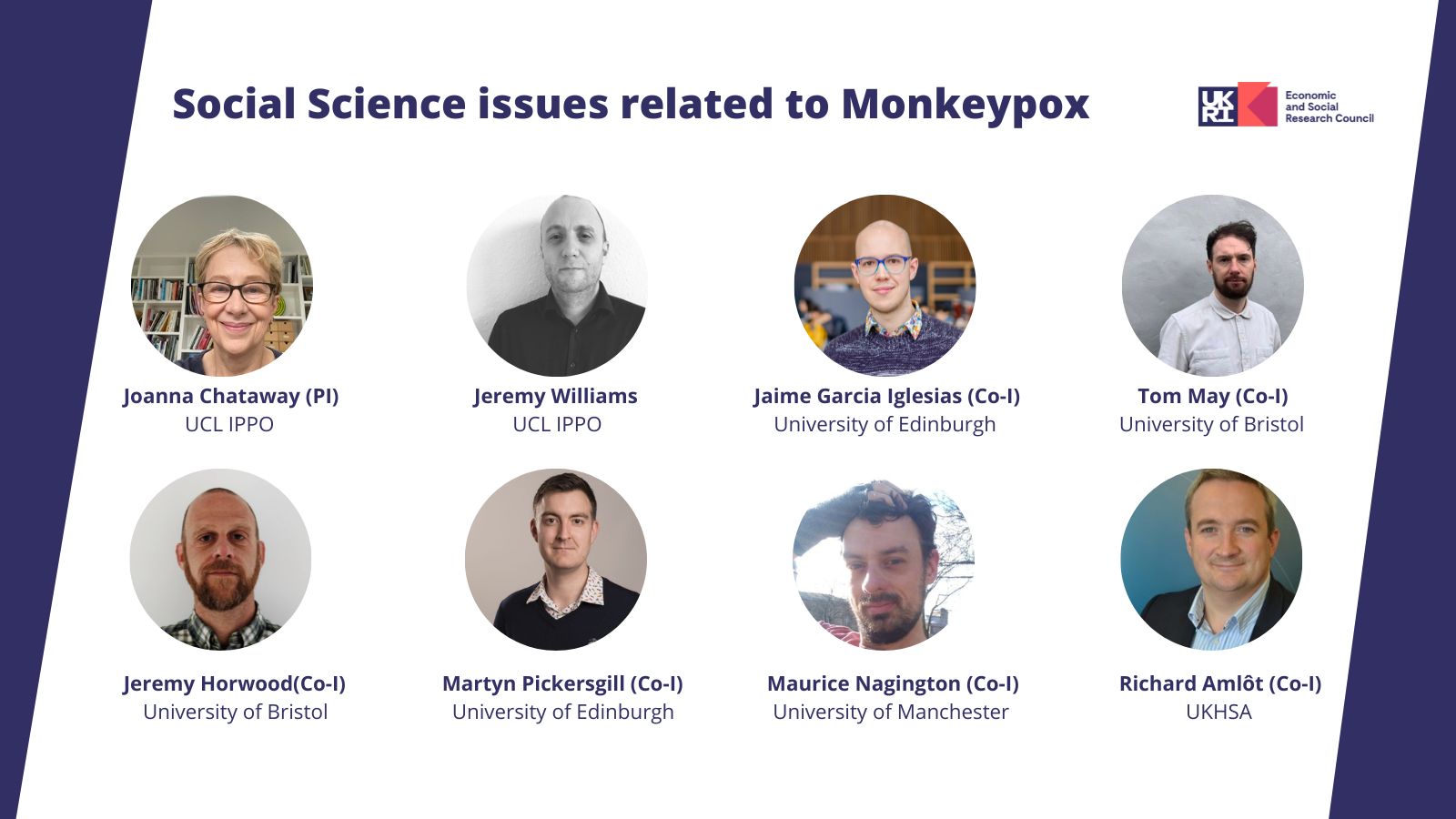Monkeypox and Social Science Issues: ESRC IPPO Project Launches Next Stage with Call For Participation

IPPO is pleased to announce the launch of Knowing and Evidencing Monkeypox: A Rapid Policy-Focused Study of Community Organising, Communication, and Vaccine Engagements. This ESRC-funded project sees the International Public Policy Observatory collaborating with colleagues from the Universities of Edinburgh, Bristol, and Manchester, and the UK Health Security Agency to fill previously-identified social science research gaps related to the current outbreak.

The project explores community organising and information sharing among men who have sex with men (MSM) in relation to Monkeypox, including the influence of social media and underserved communities. The project will use primary qualitative research to identify lessons from the outbreak for future communication and produce relevant, evidence-based recommendations for policymakers.
Goals of the Project
The project’s goals include:
- Exploring self- and community organising that took place during the current Monkeypox outbreak, including how MSM communities disseminated information about vaccines
- Probing how social media is used to organise and spread information
- Examining how underserved communities (both within and outside MSM communities) participated in or were excluded from self-organising processes during Monkeypox, the barriers to their participation, and examples of best practice
- Developing an understanding of the possibilities and limitations of social media as a tool to share information and organise in the face of viral threats
- Highlighting dynamics of exclusion of underserved communities in social media-mediated self-organising and information sharing, with a particular focus on its effects on vaccine engagements.
The project is also focused on IPPO’s core role of impactful and useful public policy interventions through producing usable, realistic, and implementable recommendations to inform both responses to the current outbreak as well as future scenarios.
These will include identifying lessons from effective self-organising and information sharing among MSM communities that can be applied to communication between public health agencies and affected communities. These lessons will support health promotion including assembling know-how around the encouragement of vaccine engagements, and will also seek to improve public policy’s ability to respond to health and social challenges experienced by historically underserved groups.
Voices of Lived Experience
A key part of the project will be a series of “deliberative fora” – roundtable workshops allowing the voices of those affected by and responding to the outbreak to be heard. Chaired by a professional facilitator, each workshop will involve a different set of stakeholders regarding the outbreak. One roundtable workshop each will be dedicated to the voices of:
- The third sector and activists
- Clinicians in sexual health, infectious disease, and general care
- Policymakers
- People with lived experience of Monkeypox
Project Outputs
The project will produce a number of output interventions for different audiences many of which will be collated at the Monkeypox Project’s dedicated area of the IPPO website. These will include:
- Roundtable Briefings. Each roundtable will be written as a summary report on the IPPO website to identify and highlight the key preliminary findings from each session and relevant 1-2-1 interviews. These will be written in an accessible format and promoted via mailing lists and social media. The briefings will be published within two weeks of each session.
- Final Report including Policy Recommendations. The project’s findings will be published in a final report including an executive summary, methods, findings, and recommendations for policymakers. It will also set out an agenda for further social science research informed by its findings, together with supporting material for differing audiences.
- Report Launch Event. The report will be accompanied by an online launch event for stakeholders including journalists, policymakers, social scientists, and research participants.
- Policy Briefings. The project team will arrange policy briefing sessions with relevant stakeholders including governments.
- Academic Journal Publications. The research team will produce an article for a public health/biomedical journal outlining key contributions and findings, as well as a peer-reviewed paper for a specialised social science audience.
- Content for Communities Involved in the Outbreak. The project will share key project findings through community-based as well as writing for community-based and popular media.
- Content for a General Audience. The project will also produce articles for a general audience via other media as well as providing social media promotion.
Get Involved
If you have been affected by Monkeypox and/or are involved in the response to the outbreak and would like to have your voice heard by participating in a roundtable, please e-mail Jeremy Williams at jeremy-williams@ucl.ac.uk. The roundtables will take place in December 2022 and January 2023, with attendees given the option of their contributions being anonymised in any public-facing material.
The project is led by Principal Investigator Jo Chataway and Jeremy Williams of IPPO (UCL), with Co-Investigators Jaime Garcia Iglesias and Martyn Pickersgill (Edinburgh), Tom May and Jeremy Horwood (Bristol), Maurice Nagington (Manchester), and Richard Amlôt (UK Health Security Agency).
